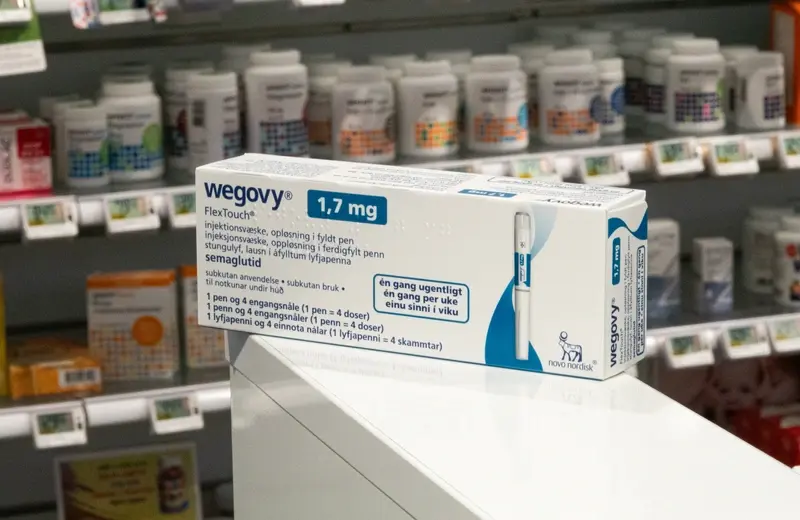
UK stocks were down at midday in London on Friday as concerns about the state of the economy persisted off the back of sluggish retail sales figures.
In Europe, pharmaceuticals heavyweight Novo Nordisk plummeted 18% in Copenhagen after disappointing data for its weight loss drug CagriSema.
The product is seen as a rival to Eli Lilly‘s Mounjaro and Zepbound obesity treatments. In premarket trading in New York, Eli Lilly shares jumped 9.3%.
In London, the FTSE 100 index was down 74.35 points, 0.9%, at 8,030.72. The FTSE 250 was down 141.26 points, 0.7%, at 20,258.12, and the AIM All-Share was down 3.17 points, 0.5%, at 708.61.
The Cboe UK 100 was down 0.8% at 805.71, the Cboe UK 250 was down 0.7% at 17,782.92, and the Cboe Small Companies was down 0.3% at 15,810.61.
Sluggish retail sales figures added to recent weak economic data adding to concerns as to the state of the UK economy.
UK retail sales rose on-month in November for the first time since August, numbers showed, but fell short of expectations.
According to the Office for National Statistics, UK retail sales volumes rose by 0.2% month-on-month in November, improving from a 0.7% fall in October but falling short of the FXStreet-cited market consensus of 0.5% growth.
On an annual basis, retail sales grew 0.5% in November. This missed the FXStreet consensus of 0.8%, and represented a slowdown from the 2.4% increase in the year to October.
Charlie Huggins at the Wealth Club said: ‘The UK consumer appears to be limping towards the finish line in 2024 - retail sales volumes came in slightly below expectations in November, with a good performance from food the only real highlight.’
Kris Hamer, director of Insight at the British Retail Consortium, said after a weak November, retailers will hope that shoppers ‘come out in force in the final days before Christmas’.
‘The final two months of the year account for over one-fifth of all sales, making it a period of vital importance – particularly for non-food.’
The report comes a day after the Bank of England lowered its fourth quarter growth forecast for the UK economy to zero from 0.3% previously. The BoE left interest rates unchanged at 4.75% and pointed to gradual rate cuts ahead.
Last Friday, figures showed the UK economy contracted by 0.1% in October, missing forecasts for 0.1% growth. On Wednesday, data showed the headline consumer prices index picked up to 2.6% in November.
The weak data, added to further robust economic growth figures in the US, put sterling under renewed pressure.
The pound was quoted lower at $1.2504 at midday on Friday in London, compared to $1.2546 at the equities close on Thursday. The euro stood at $1.0391, up against $1.0384.
Against the yen, the dollar was trading lower at JP¥156.70 compared to JP¥157.77 on Thursday.
In European equities on Friday, the CAC 40 in Paris was down 1.1%, while the DAX 40 in Frankfurt was 1.3% lower.
Novo Nordisk was the stand-out story.
The Danish drugs developer said new weight-loss drug CagriSema helped patients lose an average of 22.7% of their weight in a study. However, this missed the company’s goal for an average of 25% weight loss.
Novo Nordisk also manufactures the popular Wegovy obesity product.
The results only narrowly beat Eli Lilly’s rival drug Zepbound which led to an average 22.5% weight loss in clinical trials.
In New York, stocks were called lower. The DJIA was seen down 0.4%, the S&P 500 index 0.8% lower, while the Nasdaq Composite is called down 1.3%.
Ahead of the US open attention will be focused on the personal consumption expenditure index for November.
The expectation is that this key measure - the Fed’s preferred inflation gauge - has risen by 0.1 percentage points since October to 2.9%.
Back in London, and figures showed the UK government borrowed less than expected in November, aided by higher tax receipts and lower debt interest payments.
According to the Office for National Statistics, government borrowing - the difference between public sector spending and income – was £11.2 billion in November, down from £14.6 billion a year prior, and the lowest November reading for three years.
November’s figure was below FXStreet-cited market consensus of £15.5 billion and a drop from £17.4 billion in October.
Government receipts were £81.5 billion in November, £3.2 billion more than a year ago, boosted by increased tax receipts which rose to £61.8 billion from £58.0 billion a year ago.
Government expenditure was £88.2 billion in November down a bit from £88.4 billion a year ago. Within this, interest payable on central government debt fell to £3.0 billion from £7.7 billion, largely because the interest payable on index-linked gilts rises and falls with the retail prices index.
On London’s FTSE 100, water firms United Utilities and Severn Trent gave up Thursday’s gains after the Ofwat pricing ruling, falling 2.4% and 2.3% respectively.
On a quiet day for company news, Headlam climbed 6.8%.
The Birmingham-based floor coverings specialist announced the £53.9 million sale of three properties in Ipswich, Gildersome and Leeds at a premium of 64% to the properties’ book value and 14% to their last market valuation.
Collectively, the properties had a book value of £32.9 million. As a result, the sales generated a profit of around £21 million for Headlam.
The group now holds a net cash position, with its remaining property portfolio valued at £95.0 million.
Brent oil was quoted at $72.09 a barrel at midday in London on Friday down from $72.80 late Thursday.
Gold was quoted at $2,602.39 an ounce against $2,591.10.
Still to come on Friday’s economic calendar US personal consumption figures, Canadian retail sales data, the Michigan sentiment survey and EU consumer confidence numbers.
Copyright 2024 Alliance News Ltd. All Rights Reserved.




